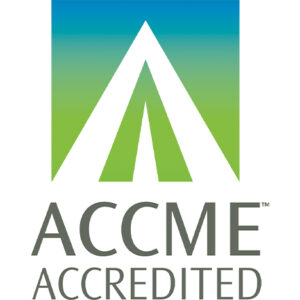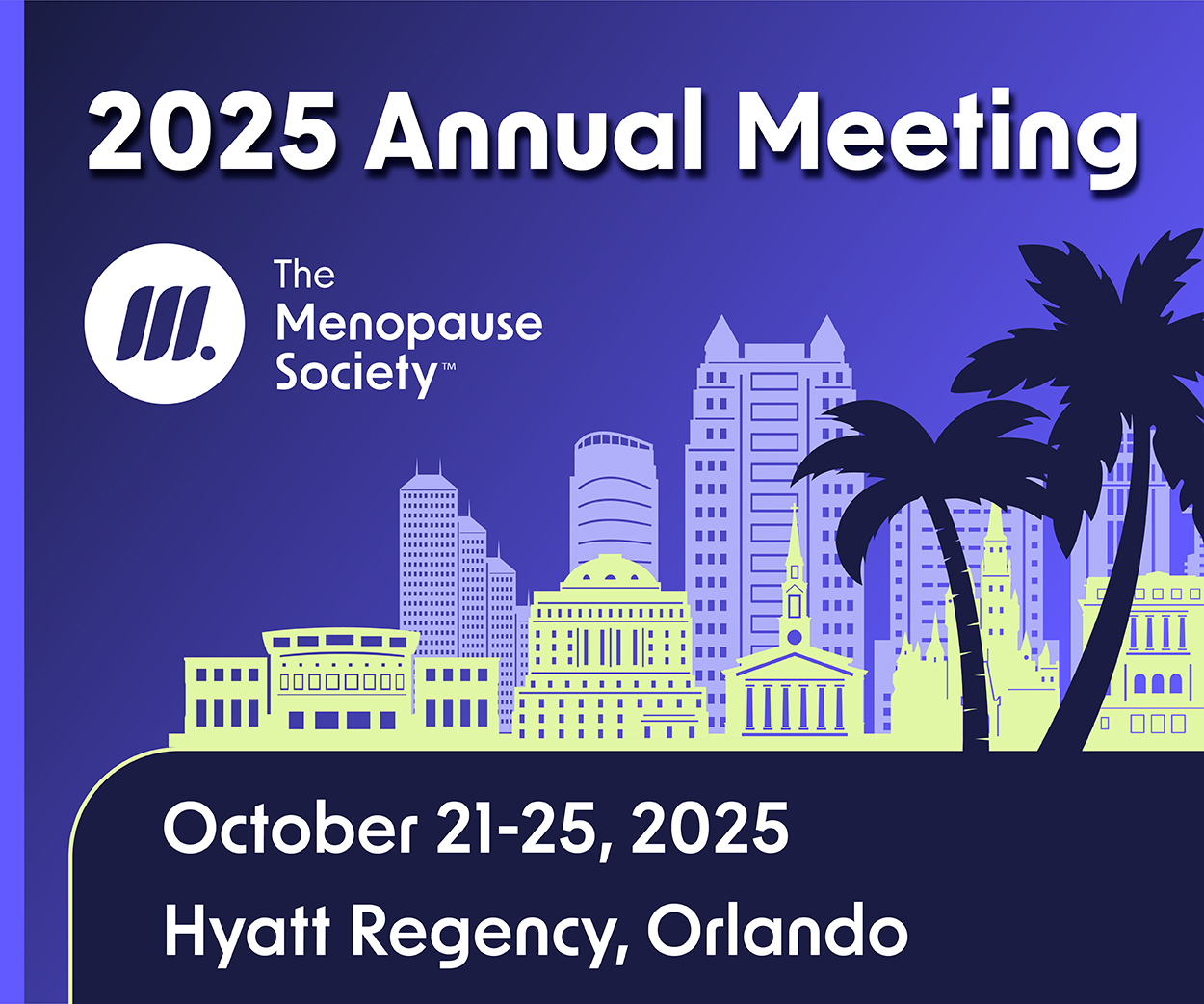Continuing Education
2025 Annual Meeting offers continuing education credits

Continuing Education
The 2025 Annual Meeting Main Program, Opening Symposium, and Menopause 101 and Sexual Health 101 courses offer opportunities to earn continuing education credits or certificates of participation by attending the events in person or by participating in the OnDemand virtual offering. For nurses and other learners who need to report contact hours of pharmacotherapeutic education, there also will be the option to earn pharmacotherapeutic credits.

The Menopause Society is accredited by the Accreditation Council for Continuing Medical Education (ACCME) to provide continuing medical education for physicians.
Learning Objectives
Menopause 101 Course
By participating in this activity, attendees should be able to
- Review menopause definitions, terminology, and physiology to develop an evidence-based framework for managing menopause-related signs and symptoms.
- Understand hormone therapy (HT) indications and contraindications, the types of HT available, and the timing hypothesis.
- Describe nonhormone therapy options, the limitations, and the role of combination therapy.
- Define approaches for managing perimenopause symptoms, including evaluating and managing abnormal uterine bleeding, vasomotor symptoms, mood-related symptoms, and weight gain.
- Discuss management of genitourinary syndrome of menopause and the various treatment modalities, including hormone and nonhormone options.
- Consider the available treatment options for the management of primary ovarian insufficiency, premature menopause, and early menopause.
- Review female sexual dysfunction at menopause, the available treatment options, and the indications for sex therapy and pelvic therapy.
- Understand the benefits and therapeutic modalities of cognitive-behavioral therapy for vasomotor symptoms, insomnia, anxiety, and depression.
Sexual Health 101 Course
By participating in this activity, attendees should be able to
- Discuss and review an office-based assessment to determine a diagnosis of female sexual problems.
- Understand the use of psychotherapy in managing the symptoms of female sexual dysfunction.
- Define approaches for nonhormone pharmacologic treatment options for female sexual dysfunction.
- Consider the role of androgens in treating hypoactive sexual desire disorder in postmenopausal women.
- Review the options for managing sexual dysfunction due to genitourinary syndrome of menopause.
- Understand how cancer affects sexual function and review the causes and treatment options.
- Describe the management of female sexual problems using lubricants, moisturizers, and devices.
Annual Meeting Main Program and Opening Symposium
By participating in this activity, attendees should be able to
- Become familiar with perimenopause and the aspects surrounding it, including contraception; bleeding changes and gynecologic symptoms; vasomotor, sleep, and mood symptoms; and personalized treatment options.
- Recognize the mind, brain, and body connections in mental health and menopause and how they work together.
- Understand weight and body composition changes at menopause, review how to manage symptoms, discuss new treatment options and their outcomes, and optimize weight loss.
- Consider bone protection in perimenopause and which treatment options are best for which patients.
- Explore the effect of progestogens on sleep, vasomotor symptoms, and breast cancer and determine treatment options.
- Discuss vulvar disorders in midlife patients, including vulvar dermatoses and new approaches to vulvodynia.
- Appreciate the importance of cardiovascular health at midlife and review primary prevention strategies for cardiovascular disease in women.
- Evaluate strategies for those with dense breasts, consider those with early surgical menopause because of breast cancer, and cardiovascular and musculoskeletal health in survivors of breast cancer.
- Become familiar with menopause in special populations, including those with primary ovarian insufficiency and Indigenous and Hispanic populations; and trauma-informed menopause care.
- Discuss vasomotor symptom management, including hormone, nonhormone pharmacologic, and nonpharmacologic option treatment strategies.
- Consider the role of androgens for muscles, mood, hypoactive sexual desire disorder, and more.
- Explore the complex interactions between the ovary and the brain in midlife and the strategies to prevent or delay ovarian aging.
- Recognize how regenerative medicine and tissue engineering have advanced cardiovascular repair technologies and the field of organ transplantation science.
- Review the role of exposure to alcohol and poor nutrition on health outcomes, including breast cancer risk, and the effect of reduced alcohol consumption in relation to cancer risk and mortality.
Continuing Medical Education Credits and Pharmacotherapeutic Hours—In-Person Meeting
Menopause 101 Course—October 21, 2025—1:00 PM–5:15 PM
The Menopause Society designates this live activity for a maximum of 4.0 AMA PRA Category 1 Credit(s)™. Physicians should claim only the credit commensurate with the extent of their participation in the activity.
Other healthcare professionals who participate in this activity will receive a certificate of participation. A maximum of 2.0 pharmacotherapeutic hours are available.
Sexual Health 101 Course—October 21, 2025—1:00 PM–5:15 PM
The Menopause Society designates this live activity for a maximum of 4.0 AMA PRA Category 1 Credit(s)™. Physicians should claim only the credit commensurate with the extent of their participation in the activity.
Other healthcare professionals who participate in this activity will receive a certificate of participation. A maximum of 2.0 pharmacotherapeutic hours are available.
Opening Symposium—Perimenopause and Main Program—Optimizing Health and Longevity at Menopause and Beyond—October 22-25, 2025
The Menopause Society designates this live activity for a maximum of 26.75 AMA PRA Category 1 Credit(s)™. Physicians should claim only the credit commensurate with the extent of their participation in the activity.
Other healthcare professionals who participate in this activity will receive a certificate of participation. A maximum of 10.5 pharmacotherapeutic hours are available.
Continuing Medical Education Credits and Pharmacotherapeutic Hours—On-Demand Virtual Offerings
Menopause 101 Course
The Menopause Society designates this internet enduring activity for a maximum of 4.0 AMA PRA Category 1 Credit(s)™. Physicians should claim only the credit commensurate with the extent of their participation in the activity.
Other healthcare professionals who participate in this activity will receive a certificate of participation. A maximum of 2.0 pharmacotherapeutic hours are available.
Sexual Health 101 Course
The Menopause Society designates this internet enduring activity for a maximum of 4.0 AMA PRA Category 1 Credit(s)™. Physicians should claim only the credit commensurate with the extent of their participation in the activity.
Other healthcare professionals who participate in this activity will receive a certificate of participation. A maximum of 2.0 pharmacotherapeutic hours are available.
Opening Symposium—Perimenopause and Main Program—Optimizing Health and Longevity at Menopause and Beyond—October 22-25, 2025
The Menopause Society designates this internet enduring activity for a maximum of 23.0 AMA PRA Category 1 Credit(s)™. Physicians should claim only the credit commensurate with the extent of their participation in the activity.
Other healthcare professionals who participate in this activity will receive a certificate of participation. A maximum of 8.0 pharmacotherapeutic hours are available.


